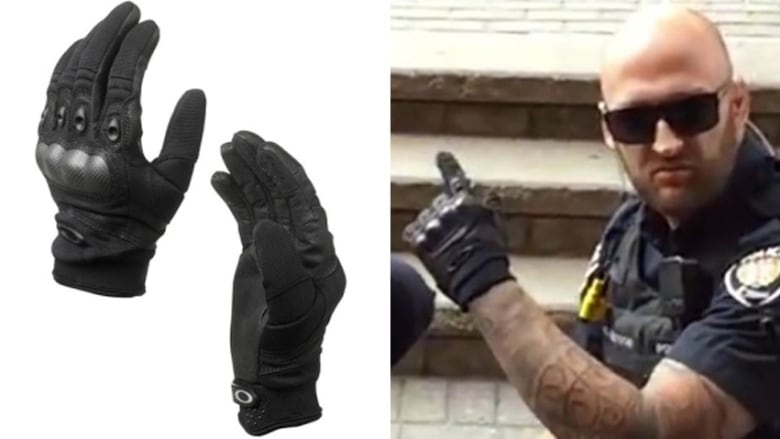Civic leaders mostly mum on reinforced gloves used by police
CBC reached out to a number of leaders about the gloves. Here are their responses

Since reporting earlier this week that reinforced gloves were worn by an Ottawa police officer during a fatal confrontation, CBC News has reached out to a number of leaders asking questions about the gloves, variations of which are used by police across the province.
- Deadly weapon? Ottawa police assault gloves scrutinized after officer charged in death
- Community-police group members raise concerns about reinforced gloves
- Police group surprised reinforced gloves could be considered weapon
- André Marin calls on police chief, board to answer questions about reinforced gloves
Sources told CBC News Const. Daniel Montsion — charged with manslaughter, aggravated assault and assault with a weapon in Abdirahman Abdi's July 2016 death — was wearing a pair of gloves reinforced with a piece of carbon fibre over the knuckles.
CBC News has learned that an internal police audit of all gloves issued to officers is underway.
The Ontario Police College does not give training to officers about the use of any gloves, including those that are reinforced.
The Ministry of Community Safety and Correctional Services is in charge of approving what weapons police can use in Ontario, but reinforced gloves aren't on the list. Gloves are classed as protective equipment, along with helmets and vests, and therefore don't require approval, the ministry said.
Here are some of the responses we've received from leaders about the gloves.

"The questions you are asking relate directly to an ongoing SIU investigation and the matter is presently before the criminal courts. Therefore, we are prohibited from answering the questions asked."

"I really can't give a comment. First of all, I'm not on the police services board, secondly, the matter is before the courts, and third, any kind of operational decision is really done by the [police] chief and not by the politicians.
"Again, I don't want to interfere with a matter that's before the courts. We want the judicial process to take its full course, and the last thing politicians should be doing is second-guessing or pontificating or speculating on police operational matters.
"We have a process in place, and the judicial system is completely independent of the political system."
Marie-France Lalonde, Minister of Community Safety and Correctional Services

"As the [minister] of Community Safety and Correctional Services, my role is to ensure that all police services have the appropriate policies and procedures in place when it comes to conflict resolution.
"All police officers in Ontario receive training at the Ontario Police College that includes de-escalation techniques, such as establishing rapport, conflict resolution, mediation and threat management. Officers must also undertake follow-up training every 12 months as part of their training.
"It would be inappropriate to comment on a matter before the courts.
"I know that police officers are increasingly interacting with vulnerable individuals, often with complex mental health issues. That is why we need to modernize police training. Police officers need the necessary tools to diffuse crisis situations and protect both themselves and their communities.
"Through our strategy of a safer Ontario, we will promote collaborative partnerships between police, the public and other sectors such as education, health care and social services and improve interactions between police and vulnerable Ontarians, including enhancing frontline responses to those in crisis. The strategy will be released the spring."
Eli El-Chantiry, chair of the Ottawa Police Services Board

Initially:
"The Ottawa Police Services Board does not have a policy on this equipment [reinforced gloves].
"The Police Services Act of Ontario prohibits members of the police services board from being involved in day-to-day police operations, and this would include matters related to equipment needs of officers."
Later on:
"The Ottawa Police Services Board is fully aware of, and prepared to act on, its responsibilities under the Police Services Act. What the board is not prepared to do is act on hearsay information that has been reported by the media and unsubstantiated in court.
"The police services board has not received any information from the SIU on this matter. And even if it had, a judicial process is underway — one that the board must respect.
"To draw conclusions, make recommendations, or create policies in advance of the judicial proceedings could undermine the process and interfere with the officer's right to a fair and impartial trial.
"As I stated publicly on behalf of the board, what will be important is how the police service moves forward and together with the community. This tragic incident was very difficult on the family and friends of Mr. Abdi, the community, and the police service, but there is a lot to be learned from this incident.
"The Ottawa Police Services Board will be following the court proceedings, much like many members of the community. When the facts of the case are brought to light, the board will be in a position to represent the community interests and work with the police service to address any possible gaps."